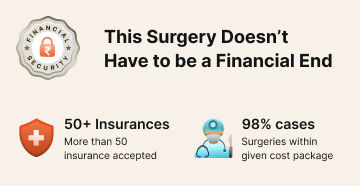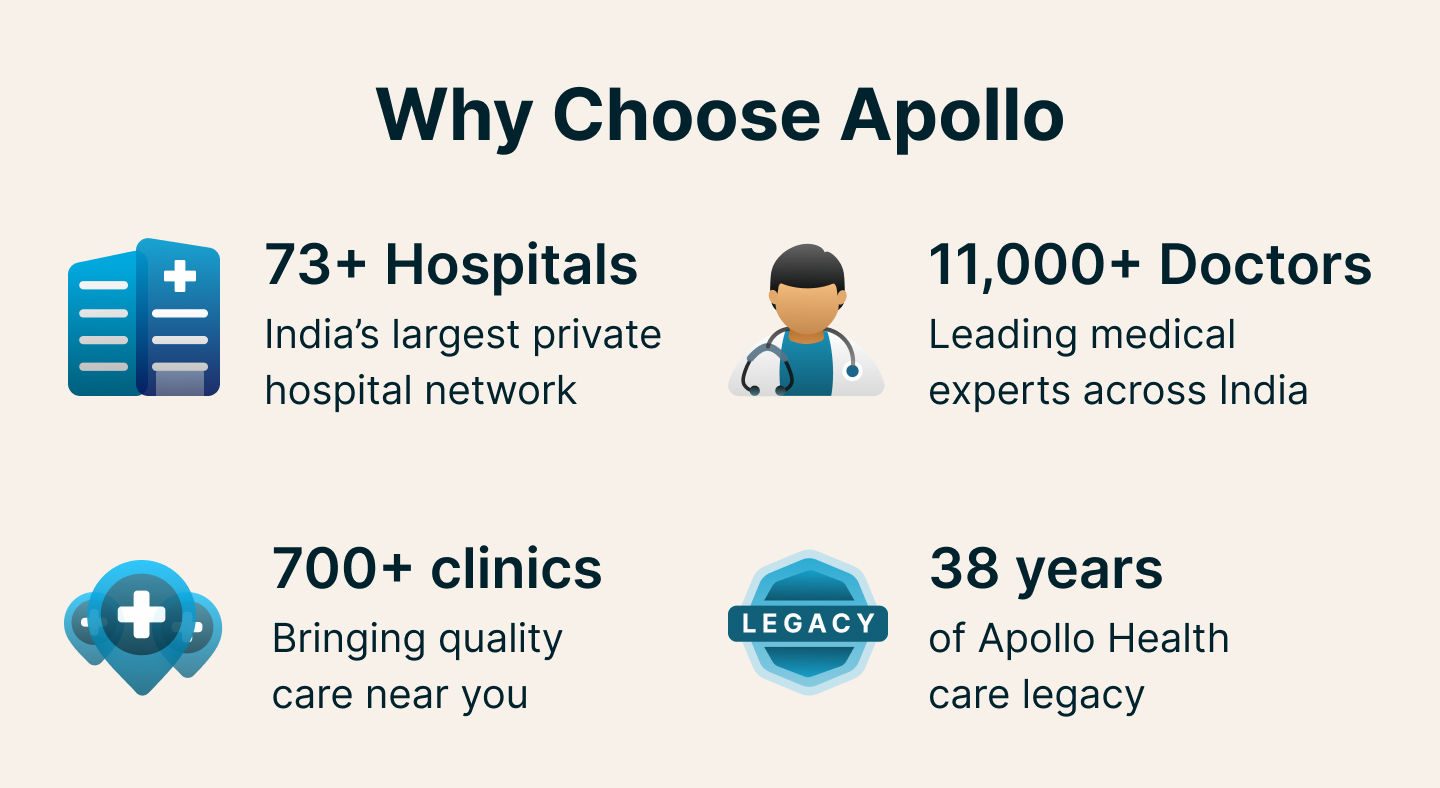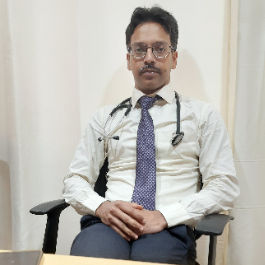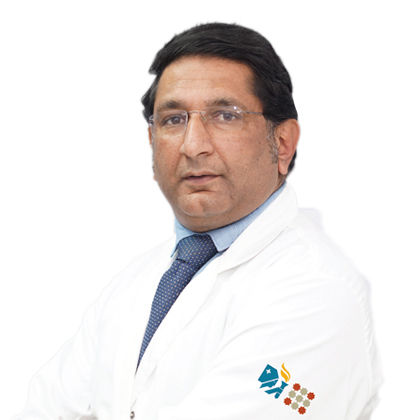Coronary Artery Bypass Grafting Surgery Cost in India
Numerous Treatment Options
Excellent Infrastructure & Facilities
Expert Heart Surgeons
Advanced & Affordable Surgical Care

Get Free Cost Estimate
Choose the right medical subscription for you
| procedures | minimum | average | maximum |
|---|---|---|---|
| CABG Surgery | ₹400000 | ₹600000 | ₹900000 |
| Coronary Angioplasty | ₹100000 | ₹200000 | ₹300000 |

Contact us regarding the pricing and overall process of the procedure


Which procedure is right for me ?
| Feature | CABG Surgery | Coronary Angioplasty |
|---|---|---|
| Hospital Stay | 5–7 days | 1–2 days |
| Recovery Time | 6–12 weeks | 1–2 weeks |
| Procedure Time | 3–6 hours | 1–2 hours |
| Anesthesia | General | Local + Sedation |
| Invasiveness | Highly invasive | Minimally invasive |
| Suitable For | Multiple blockages | Fewer blockages |
| Long-term Relief | Higher | Moderate |
| Post-op Monitoring | Intensive | Minimal |
Get Coronary Artery Bypass Grafting Surgery (CABG) certified doctor’s Second Opinion
Hear from our old patients
Kunal Chaudhery
30 years old Male
I had a wonderful experience during my recent visit to Apollo Hospital to consult with Doctor Vipul Roy. He showed great attentiveness to what we had to say, listened carefully, and demonstrated his expertise by providing excellent treatment for my father. He was very receptive to our concerns and made sure to explain everything to us thoroughly and in a way that we could easily understand. Overall, I would highly recommend Doctor Vipul for his exceptional skills and attentive bedside manner.
Praneet kumar
29 years old Male
My father had encountered a heart issue (possible minor heart attack) at Bengaluru. I didn't wanted to risk his life in Bengaluru so after consulting my uncle he suggested Dr Vipul Roy's name.He is one of few honest doctor who is not money minded. He spent close to 25 mins examining my father and heard him out patiently. I am thankful to him and my uncle for suggesting his name . I recommend him for any issues related to cardiac issues

CABG Surgery
Coronary artery bypass graft surgery, commonly known as CABG (pronounced cabbage), is a reliable approach to combat coronary artery disease. In India, cardiac surgeons perform this life-saving procedure using state-of-the-art facilities. The cost of CABG surgery in India varies depending on the hospital and the patient's medical condition. Nevertheless, the price of CABG generally ranges between INR 1.5-3 lakhs. There are different types of CABG surgery, including traditional CABG, off-pump CABG, and minimally invasive direct coronary artery bypass (MIDCAB), each tailored based on patient needs.
Cost of Coronary Artery Bypass Graft (CABG) Surgery
While the cost of CABG surgery may appear substantial at first glance, it’s important to view it through the lens of long-term health, quality of life, and financial sustainability. This heart surgery doesn’t just treat your condition—it helps you feel better, live longer, and avoid more medical costs in the future.
- Pain Relief and Cardiac Stability: CABG significantly reduces chest pain (angina), shortness of breath, and fatigue caused by blocked coronary arteries. This allows patients to move more freely and resume daily tasks without strain.
- Enhanced Quality of Life: Improved blood flow to the heart boosts overall heart function, leading to better energy, restful sleep, and a renewed ability to enjoy routine and recreational activities without constant health concerns.
- Long-Term Health Investment: Though it involves an upfront cost, CABG reduces the likelihood of recurring hospital admissions, emergency procedures, and medication dependency—leading to lower healthcare expenses over time.
- Renewed Strength & Productivity: Post-surgery, many patients regain the physical and mental capacity to return to work, support their families, and participate actively in personal and professional commitments.
What is Coronary Artery Bypass Graft Surgery?
Coronary artery bypass graft (CABG) surgery is a surgical procedure to improve blood flow to the heart. In patients with coronary artery disease, the arteries that supply blood to the heart muscle become narrowed or blocked owing to fatty deposits known as plaque. During the CABG procedure, the surgeon creates a new pathway for blood to bypass these blockages using a vessel graft taken from another part of the patient's body. This graft is attached above and below the area of blockage in the coronary artery, effectively creating a 'bypass' for blood flow.
Also called heart bypass surgery or simply CABG, this procedure does not cure the underlying disease that caused the blockage, such as atherosclerosis or coronary artery disease; however, it can significantly alleviate symptoms such as chest pain and shortness of breath. Moreover, bypass surgery can decrease the risk of heart disease-related deaths.
Why is Coronary Artery Bypass Graft Surgery Done?
CABG surgery is typically performed to improve blood supply to the heart muscle by bypassing blocked or narrowed coronary arteries. Here are some key reasons why your doctor might recommend the CABG procedure:
- Presence of a blockage in the left main coronary artery. This artery is responsible for supplying a significant amount of blood to the heart muscle.
Severe narrowing of the heart's main artery. - Intense chest pain (angina) owing to the narrowing of several coronary arteries, limiting blood flow to the heart during light exercise or even at rest.
- Presence of more than one diseased coronary artery, coupled with a poorly functioning lower left chamber of the heart.
- A blocked coronary artery that cannot be successfully treated with coronary angioplasty, a less invasive procedure that uses a balloon-tipped catheter to widen the artery and often involves placing a small coil (stent) to keep the artery open.
- An unsuccessful angioplasty procedure, where, for instance, the artery has narrowed again after stenting.
Preparation for Coronary Artery Bypass Graft Surgery
CABG surgery is a critical operation performed by highly skilled cardiovascular surgeons. The following sections will guide you through the entire process, from preparation and the actual CABG procedure steps to post-CABG care and recovery. This information aims to ensure your journey towards a healthier heart is as smooth as possible.
Before a Coronary Artery Bypass Graft Surgery
To prepare for the CABG procedure:
- Your doctor will explain the procedure in detail, allowing you to ask any questions.
- You will sign a consent form, authorising the surgery.
- Your medical history will be reviewed, and a physical examination will be performed to ascertain your health status before the procedure.
- You may undergo additional tests such as blood tests, chest X-ray, ECG (electrocardiogram), and an echocardiogram.
- Certain medications, like blood thinners, may need to be stopped before the surgery, as directed by your doctor.
- If you smoke, it's advisable to quit well before the surgery, as it can significantly improve your chances of a successful recovery.
- You'll be asked to fast for 8 hours before the operation, typically after midnight.
During a Coronary Artery Bypass Graft Surgery
During coronary artery bypass surgery:
- Anaesthesia is administered to ensure you feel no pain during the operation.
- Your surgeon will make an incision in your chest to gain access to your heart.
- A heart-lung bypass machine temporarily replaces the function of your heart and lungs during the surgery.
- Your surgeon will graft blood vessels from other parts of your body to create new routes for blood to flow around blocked or damaged arteries in your heart.
- The surgery typically takes between 3-6 hours to complete.
After a Coronary Artery Bypass Graft Surgery
Once CABG surgery has been completed:
- You will be in the intensive care unit for 24 hours post-CABG for close monitoring.
- A ventilator may be used to help you breathe until you're fully awake and can breathe independently.
- You'll be connected to various monitors and tubes, including a heart monitor, blood pressure monitor, and bladder catheter.
- Your healthcare team will encourage you to do breathing exercises and start walking immediately to aid your recovery.
- You will typically be discharged 5-7 days after CABG to continue your recovery at home.
Medical Tests & Check-ups Before Coronary Artery Bypass Graft Surgery
Before you undergo heart bypass surgery, your doctor will ensure your overall health status is good. The tests and check-ups before CABG may include:
- Physical Examination and Medical History Review: Your doctor will perform a comprehensive physical examination and assess your medical history to evaluate your overall health and identify any potential risk factors.
- Blood Tests: Blood tests for the CABG procedure help check several aspects, such as your complete blood count, clotting factors, kidney function, and electrolyte levels. If any anomalies are identified, they need to be rectified before CABG surgery.
- Cardiac Tests: To assess your heart condition, an electrocardiogram (ECG/EKG) will be performed. An echocardiogram will also be perfomed to evaluate your heart's structure and pumping function. Your heart's arteries can be visualised through a test called cardiac catheterisation, which helps determine the extent of blockages.
- Lung Function Tests: If you suffer from lung diseases like COPD, pulmonary function tests will be conducted to ensure your lungs can handle the surgery.
- Other Tests: A chest X-ray for CABG will be conducted to determine your heart and lung health. Screening for infections like MRSA will also be performed.
Using the test results, your doctor will precisely devise a plan for your CABG procedure. Any special considerations for your health status will also be identified.
Recovery & Care After Coronary Artery Bypass Graft Surgery
Recovering from a CABG procedure takes time and patience. You must follow the guidance provided by your healthcare team. Here's what you can expect during this period:
- Immediately After Surgery: You'll be closely monitored in the intensive care unit for the first 24 hours. You might need a ventilator to help you breathe until you can do so independently. Various monitors and tubes will be connected to you to track your vital signs and fluid levels.
- First Few Days After Surgery: Your healthcare team will guide you on breathing exercises, coughing, and walking to facilitate your recovery. As your digestive system recovers, you'll gradually be able to eat and drink. Pain medication will be given as required.
- Continuing Recovery: You'll slowly increase your activity level and mobility over the following days. Your stitches or staples will be removed before you are discharged, typically 5-7 days post-CABG. Instructions on caring for your incision, resuming routine activities, and any dietary or medication changes will be provided.
The key to a successful recovery is following the guidelines offered by your healthcare team, maintaining an active lifestyle, and giving your body ample time to heal. With proper care, most patients undergoing CABG can resume regular activities within 4-6 weeks after the procedure.
Types of Medication Post Coronary Artery Bypass Graft Surgery
After undergoing coronary artery disease surgery, a patient is often prescribed several types of medication. These help decrease the risk of future cardiovascular events and aid in the patient's recovery. Here are some categories of medications commonly prescribed:
- Antiplatelet Therapy: This category includes medications that prevent blood clots from forming by inhibiting the clumping of platelets.
- Statins: These medications help lower the levels of bad cholesterol in the blood and prevent the development of new blockages in the arteries.
- Beta-Blockers: These medications help decrease blood pressure, slow down the heart rate, and decrease the heart's demand for oxygen.
- RAAS Inhibitors: These medications, including angiotensin-converting enzyme (ACE) inhibitors and angiotensin II receptor blockers (ARBs), help decrease blood pressure and protect the heart after CABG.
Diet & Lifestyle Changes Post Coronary Artery Bypass Graft Surgery
Adapting to a healthier lifestyle post-CABG is as crucial as adhering to prescribed medications. The following changes can go a long way in promoting heart health and aiding recovery:
- Adopt a Heart-Healthy Diet: Focus on consuming food items low in saturated fat and salt, but rich in fibre and omega-3 fatty acids. Foods to avoid after bypass surgery include processed meats, butter, cream, and baked goods. Instead, prioritise whole grains, fruits, vegetables, and oily fish - these should form the major components of your diet after CABG surgery.
- Regular Exercise: Engage in moderate-intensity aerobic activities such as brisk walking, cycling, or swimming for at least 150 minutes per week. Remember to start slowly and gradually increase your intensity as your fitness improves.
- Weight Management: If you're overweight, try to achieve a healthier body mass index (BMI). This reduces your risk of cardiovascular diseases and supports long-term heart health after the CABG procedure.
Sustainable lifestyle changes are the key to supporting your heart's health post-CABG. Following a post-bypass surgery diet chart, coupled with regular exercise and recommended medications, can significantly reduce the risk of future cardiovascular events.
Disclaimer: This information is for educational purposes only and not a substitute for professional medical advice. Always consult your doctor for medical concerns.
FAQs
Is coronary artery bypass graft surgery (CABG) an open or closed procedure?
CABG is typically an open procedure, which means that the chest is opened to access the heart. However, recent medical advancements have also introduced minimally invasive procedures, which can be performed through smaller incisions.
Is CABG a better choice than stents?
The choice between CABG and stents depends on various factors such as the patient's health condition, the number and location of blockages, and the doctor's recommendation. Some studies suggest that CABG may be more beneficial for individuals with multiple blockages or diabetes.
What are the two types of CABG?
The two types of CABG are traditional CABG and off-pump coronary artery bypass (OPCAB). Traditional CABG uses a heart-lung machine, whereas OPCAB is performed while the heart is still beating.
Is CABG similar to an angioplasty?
No, CABG and angioplasty are different procedures. Angioplasty involves widening the narrowed or blocked arteries using a balloon, whereas CABG involves grafting a new artery or vein bypassing the blocked one.
What is the age limit for undergoing CABG?
There isn't a strict age limit for CABG. The decision is usually based on the overall health of the patient rather than age alone.
How long is the recovery time after CABG?
Typically, patients spend about 5-7 days in the hospital post-CABG. The CABG recovery time may be approximately 6-12 weeks, depending on individual circumstances.
Which hospital is best for CABG in $citytoken?
Apollo Hospital in $citytoken is renowned for its cardiac care unit and has a team of experienced doctors who specialise in performing CABG.
What treatment is involved in CABG?
CABG involves grafting a healthy artery or vein from another part of your body to reroute blood around the blocked coronary artery. This is done under general anaesthesia in an operating theatre.
What is the average cost of CABG surgery in $citytoken?
The cost of CABG can vary significantly based on the hospital and the complexity of the case, but on average, it may range from 1.5 to 3 lakh rupees.
Which patients require CABG?
CABG may be recommended for patients with severe coronary heart disease that cannot be managed with medication or less invasive procedures. This could include individuals experiencing chest pain, those with heart failure, or those at high risk of a heart attack.














